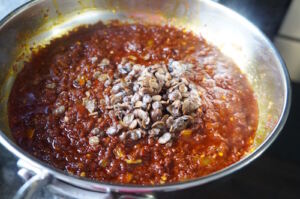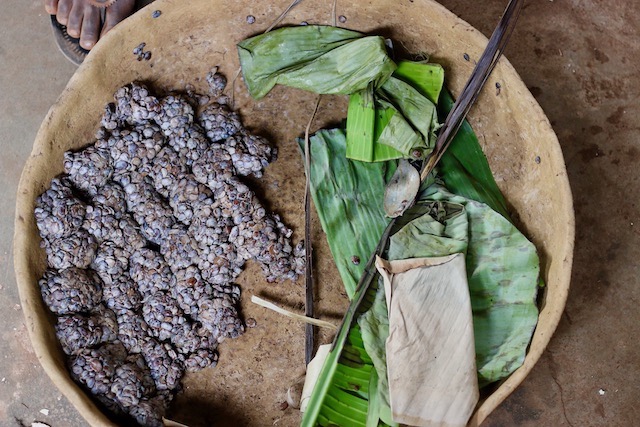Why Iru Is Nutritious and Healthy
Iru, also known as ogiri and dawadawa, is a traditional Nigerian condiment made with fermented beans from the African locust tree (Parkia biglobosa). Iru is nutritious and treasured for its rich, complex flavour.
Although it is not well known in the Western world, iru is a nutritious superfood that has been used and cherished in Africa since ancient times.
Iru is a fermented food with a unique smell and complex, savoury flavour. Some find the smell unpleasant at first but soon fall in love with the taste it gives food.
Iru is nutritious and provides many health benefits, such as blood sugar management, weight loss, and improved heart health.
Accordingly, this article provides an overview of the health benefits of iru and why you should try it or eat it more often.
What is Iru?
Iru is also known as ogiri and dawadawa. Nigerians love iru for its distinct smell and complex flavour, described as a mix of stinky cheese and chocolate (1–2).
To make iru, people boil African locust beans for 8-12 hours, then hull them, and finally ferment them (3). At this time, scientists have discovered that the beans contain several strains of bacteria, including Bacillus, Leuconostoc, and Staphylococcus species (3).
Additionally, there are two types of iru: iru woro and iru pete. Iru woro is a harder product due to a reduced fermentation time frame. In contrast, iru pete is softer in texture because it is fermented with the addition of iku-iru, a product of hibiscus seeds.
In Nigeria, people use iru to flavour soups, stews, and sauces. When cooking, you can add iru woro to egusi soup, ogbono soup, and efo riro, and iru pete to ewedu soup, pepper soup, and ayamase.
As well, fermentation decreases the amount of carbohydrate and increases the concentration of antioxidants found in iru (4).
Summary
To sum up, iru is a superfood traditionally used in Nigeria. To make iru, people boil, hull, and ferment African locust beans. Overall, Nigerians love iru for the complex, rich flavour it gives soups, stews, and sauces.

Iru is a superfood commonly added to soups, stews, and sauces.
Iru is Nutritious
Iru is rich in several nutrients that are necessary for optimal health (5,6,7,8). Here is the calories and nutrition data for iru.
100g of iru woro:
- Calories: 253
- Fat: 13 grams
- Carbs: 15 grams
- Fibre: 3 grams
- Protein: 22 grams
- Calcium: 209 mg (19% DV)
- Iron: 5 mg (36% DV)
- Magnesium: 232 mg (55% DV)
- Phosphorous: 139 (11% DV)
- Potassium: 258 mg (5% DV)
- Zinc: 0.5 mg (5% DV)
100g of iru pete:
- Calories: 237
- Fat: 13 grams
- Carbs: 14 grams
- Fibre: 3 grams
- Protein: 19 grams
- Calcium: 64 mg (6% DV)
- Iron: 5 mg (36% DV)
- Magnesium: 233 mg (55% DV)
- Phosphorous: 149 (12% DV)
- Potassium: 286 mg (6% DV)
For one thing, iru is a good source of antioxidants and phytochemicals, which are beneficial compounds found in plants (4).
As well, iru is nutritious because it is a fermented food. Fermented foods provide good bacteria called probiotics, which are known to improve health in several ways (9).
Fermentation also makes food more digestible, which makes it easier for your body to break down the food and absorb its nutrients (10).
Summary
In summary, iru is a good source of protein, fibre, magnesium, and iron. Due to fermentation, iru has more antioxidants and is more easily digested than unfermented African locust beans.
Iru Is Rich in Fibre and Probiotics for Gut Health
Iru is a good source of soluble and insoluble fibre (11). Insoluble fibre promotes regular bowel movements and soluble fibre promotes feelings of fullness and reduces cholesterol levels (12–13).
Moreover, fibre is a “prebiotic” because our body’s enzymes can’t digest it (14).
Fibre travels through your digestive system to the colon where it provides food for good bacteria. In this way, fibre encourages the growth of good bacteria in the gut (14).
In addition to prebiotics, iru provides probiotics, which help the body digest food and prevent the growth of harmful bacteria in the gut (15).
Probiotics can also improve your immune system, prevent cancer, treat bowel conditions, and lower blood pressure (15–16).
As well, fermentation reduces the amount of anti-nutrients in iru (17). Anti-nutrients are molecules found in plants that reduce your body’s ability to absorb nutrients (17).
Summary
In short, iru is a good source of prebiotics and probiotics which support a healthy gut. Additionally, fermentation improves the digestibility of African locust beans so your body can absorb more of its nutrients.
Iru Is a Superfood That May Lower Blood Sugar
Diabetes is a common condition around the world (18). People with diabetes have high blood sugar levels and related symptoms (18).
In general, diabetes develops when your pancreas doesn’t produce enough insulin, your cells are resistant to insulin, or both (18).
Interestingly, researchers found that feeding diabetic rats African locust beans increased weight loss and lowered fasting blood sugar as much as a drug for diabetes (glibenclamide)(19).
Iru is a superfood that has the potential to improve diabetes through a combination of lower blood sugar levels and weight loss, which helps improve insulin sensitivity (20).
As well, the fibre in iru can increase the feelings of fullness after eating. This can help you feel satisfied when eating fewer calories to lose weight (21).
Summary
In essence, iru lowers blood sugar levels and increases weight loss in diabetic rats. However, more research is needed before we can make conclusions about diabetes management in people.
Iru Is Rich in Fibre and Antioxidants for Heart Health
Iru is a good source of soluble fibre which decreases LDL cholesterol levels. Even more, iru is rich in antioxidants, which can prevent inflammation and promote a healthy heart (22).
There are two types of cholesterol: low-density or LDL cholesterol (bad cholesterol) and high-density or HDL cholesterol (good cholesterol) (23).
It is important to realize that while high levels of triglycerides, total cholesterol, and LDL cholesterol increase your risk for heart disease, higher levels of HDL cholesterol promote heart health (23).
In fact, studies in rats have shown that consuming iru decreased LDL cholesterol and increased HDL cholesterol (19,23).
Similarly, researchers found that those who ate iru regularly had lower levels of LDL cholesterol and triglycerides, and higher levels of HDL cholesterol and magnesium compared to those who didn’t eat iru (24).
Summary
In conclusion, iru is nutritious and rich in soluble fibre and antioxidants, which promote heart health and healthy blood cholesterol levels.
Iru May Prevent Iron-Deficiency Anemia
Iru is a good source of essential minerals, such as iron, calcium, and phosphorus (5-6).
Therefore, iru may prevent iron-deficiency anemia because it is high in iron (25).
As well, research has found that fermented foods, including iru, increase hemoglobin (the protein that carries oxygen in red blood cells) and red blood cell count (26).
Summary
In brief, iru may prevent anemia because it is rich in iron and because it stimulates the production of red blood cells.
Iru Is a Superfood that Lowers Inflammation
Iru is rich in antioxidants that prevent inflammation.
In fact, inflammation is a key factor in many illnesses and chronic diseases (27).
An imbalance between reactive oxygen species and antioxidants can lead to inflammation and oxidative stress, which is harmful to cells and tissues (28).
Not only does normal metabolism create reactive oxygen species, but also UV radiation, environmental stress, and pollutants (28).
Notably, research shows that iru inhibits the process of inflammation, which may be due to its high antioxidant content (29). Antioxidants can prevent inflammation because they reduce oxidative stress (28).
In an animal study, rats with oxidative liver damage who ate iru had increased liver antioxidant levels and decreased liver damage (30).
Summary
In essence, iru lowers inflammation and oxidative stress because it is high in antioxidants.
The Verdict
Iru is a superfood that provides minerals, fibre, protein, and probiotics.
Accordingly, iru may reduce inflammation, promote gut health, and reduce levels of blood sugar and LDL cholesterol in the blood.
As well, iru has no known side effects or drug interactions, so it is safe for most people.
If you want to try iru, start by adding some to your soups, stews, and sauces.
Are you looking to lose weight or simply eat healthier in 2023? If yes, then reach out to us via WhatsApp or by using our contact form.


wow this is so educative! Thank you so much Ronke
Coach why? The smell oooo. I can’t:-(
thanks for this information
Thanks so much for this information, it’s really open my understanding concerning the nutritional benefits of iru.
I left some in my freezer.
Will bring it out and start using them asap.
Thank you for enlightening me about its importance.
thank you Ronkus. this is quite informative.
My own is that iru helps me eat my greens as I can’t eat vegetables sauces or soup without it☺ glad to learn it has more work to do in my body.
Thank you for the infor. Iru is indeed a superfood
Woooow, thank you so much for always educating us on how beneficial Nigerian meals are and encouraging us to stick to our rich culture. Keep up the good work Ronke and LIN team 👍🏼
Thanks for the write up. Would be nice if you could give some of the literature references used.
Thanks for reading. :) The references are actually included as links at the end of sentences (the numbers in the brackets). Hope that helps!
Thanks so much for information